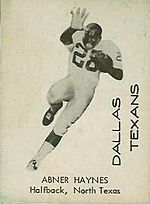Abner Haynes facts for kids

Haynes displayed on a 1960 card
|
|||||||||||||||||
| No. 28 | |||||||||||||||||
|---|---|---|---|---|---|---|---|---|---|---|---|---|---|---|---|---|---|
| Position: | Halfback Return specialist |
||||||||||||||||
| Personal information | |||||||||||||||||
| Born: | September 19, 1937 Denton, Texas, U.S. |
||||||||||||||||
| Died: | July 18, 2024 (aged 86) Dallas, Texas, U.S. |
||||||||||||||||
| Height: | 6 ft 0 in (1.83 m) | ||||||||||||||||
| Weight: | 190 lb (86 kg) | ||||||||||||||||
| Career information | |||||||||||||||||
| High school: | Lincoln (Dallas) | ||||||||||||||||
| College: | North Texas State (1957–1959) | ||||||||||||||||
| NFL Draft: | 1960 / Round: 5 / Pick: 55 | ||||||||||||||||
| AFL draft: | 1960 / Round: First selections | ||||||||||||||||
| Career history | |||||||||||||||||
|
|||||||||||||||||
| Career highlights and awards | |||||||||||||||||
|
|||||||||||||||||
| Career AFL statistics | |||||||||||||||||
|
|||||||||||||||||
| Player stats at PFR | |||||||||||||||||
Abner Haynes (born September 19, 1937 – died July 18, 2024) was an American professional football player. He was a talented halfback and return specialist in the American Football League (AFL). Haynes played college football at North Texas State. He became one of the first big stars in the AFL.
Contents
Early Life and College Football
Abner Haynes was born in Denton, Texas. He went to Lincoln High School in Dallas. After high school, he played college football at North Texas State College. In 1957, Abner and his teammate Leon King made history. They were the first African American players to play college football in Texas. This was a very important step for sports in the state.
A Star in Professional Football
Abner Haynes was chosen by two different teams in 1960. He decided to play for the Dallas Texans in the new AFL. This was a big choice, and it paid off!
First Year Success
In the AFL's very first year (1960), Haynes was amazing. He was named the league's first Player of the Year. He also won the Rookie of the Year award. Haynes led the AFL in rushing yards that year. He was also great at catching passes and returning kicks. He helped make the AFL popular.
Playing for the Texans and Chiefs
Haynes played three years in Dallas for the Texans. Then, the team moved and became the Kansas City Chiefs in 1963. He played two more seasons with them. His jersey number, 28, was retired by both the Chiefs and North Texas. This shows how important he was to both teams.
His coach, Hank Stram, said Haynes could do it all. He was great at running, catching, and returning kicks. Haynes set many AFL records. He scored 5 touchdowns in one game. He also scored 19 touchdowns in the 1961 season. In his career, he scored 46 touchdowns. He still holds 10 Texans team records.
Winning a Championship
In 1962, Haynes helped the Texans win the AFL championship game. It was a very long game against the Houston Oilers. It went into double-overtime! Haynes scored two touchdowns in that game. One was a pass from quarterback Len Dawson. The other was a run.
Moving to Other Teams
Before the 1965 season, Haynes was traded to the Denver Broncos. He believed this trade happened after he and other players protested. They were concerned about how players were treated in New Orleans during the 1965 AFL All-Star game. The game was later moved to Houston.
In 1965, Haynes continued to play well for the Broncos. He scored rushing and receiving touchdowns. He also led the league in kick returns. He played for the Miami Dolphins and the New York Jets in 1967.
Career Highlights
Over his 8 years as a professional player, Abner Haynes gained over 12,000 combined yards. This was an AFL record! He was known for his speed and amazing moves. He was chosen for the All-Time All-AFL second-team.
A Famous Coin Toss Story
In the 1962 AFL Championship Game, Abner Haynes was part of a funny moment. The Texans won the coin toss for overtime. Coach Stram told Haynes to choose the end of the field facing the stadium clock. This would give the Texans the wind at their backs.
Haynes, thinking he knew what to say, told the referee, "We'll kick to the clock." But by saying "We'll kick," he accidentally chose for the Texans to kick off! This meant the Oilers got to choose which goal to defend. Luckily, the Texans defense played great. They stopped the Oilers from scoring. The Texans then won the game in the second overtime.
When asked about his mistake, Haynes joked, "I knew we'd need the wind behind us in the sixth quarter."
Personal Life
Abner Haynes was related to some famous musicians. He was a cousin of Sly Stone, Rose Stone, and Freddie Stone from the band Sly and the Family Stone. Abner Haynes passed away on July 18, 2024, at the age of 86.
See also
 In Spanish: Abner Haynes para niños
In Spanish: Abner Haynes para niños

